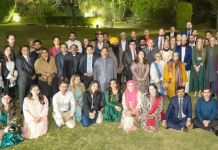ISLAMABAD, JUL 9 /DNA/ – Renowned economic expert and former President of the Islamabad Chamber of Commerce, Shahid Rasheed Butt, warned on Wednesday that the ongoing decline in cotton production poses a serious threat to Pakistan’s economy.
He welcomed Prime Minister Shahbaz Sharif’s recent attention to the problems of farmers and the textile sector but stressed that announcements alone are not enough. Without urgent, coordinated, and practical actions, the cotton sector cannot be revived.
In a statement issued today, he said that setting the support price of cotton at Rs 8,500 per 40 kg and forming a high-level committee are positive steps. However, these measures will be ineffective unless implemented immediately.
Shahid Rasheed Butt revealed that Pakistan’s cotton production has decreased by more than 60 percent over the past decade. Once, the country produced 14 million bales, but that has now dropped to just 5.5 million bales.
This sharp decline has made Pakistan heavily dependent on imported cotton, draining valuable foreign exchange and weakening export competitiveness. It is estimated that Pakistan will import 5.4 million bales of cotton in the 2024-25 fiscal year at a cost of around $1.9 billion. This will further strain the current account and foreign exchange reserves, putting pressure on the local currency.
The business leader noted that cotton and textiles account for nearly 60 percent of Pakistan’s total exports and approximately 11 percent of its GDP. A crisis in this sector not only damages the broader economy but also impacts millions of farmers, laborers, and industrialists. Due to declining production, over 60 percent of the country’s ginning factories have shut down, resulting in increased unemployment.
He identified poor seed quality, climate change, high production costs, the expansion of sugarcane cultivation, and inconsistent policy as the primary reasons behind the decline of the cotton sector. He also criticized agricultural research institutions for failing to provide farmers with high-quality seeds.
Despite current challenges, Butt sees hope in recent hybrid cotton experiments in both public and private sectors. He urges the government to focus on improving seed quality and boosting agricultural research. His suggestions include measures to help farmers lower input costs and establishing designated cotton zones with strict enforcement. These are more than suggestions—they are a roadmap to a brighter future for the cotton industry.
Mr. Butt envisions a future of modernization for the cotton sector. He proposes reviving ginning and spinning factories through targeted incentives and subsidies. He also emphasizes the importance of increasing textile exports through practical support.
Furthermore, he sees potential in introducing innovative farming tools, mobile apps, and drone technology to equip farmers with advanced techniques, boost productivity, and usher in a new era for the industry.
“This is no longer just an agricultural issue. It has become a national economic crisis that demands immediate and serious attention from all relevant authorities,” Shahid Rasheed Butt concluded.

















